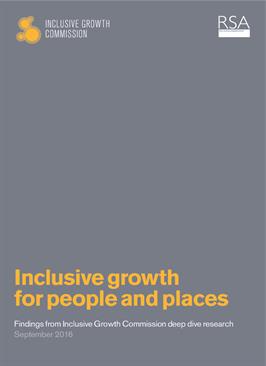As part of its inquiry, the Inclusive Growth Commission is undertaking a comprehensive programme of research, evidence collection and engagement.
In order to inform its analysis of place-based dimensions of inclusive growth, the Commission undertook three ‘deep dive’ research visits in Bradford, Cardiff city region and Newcastle. This report provides an analysis of findings from this research. It seeks to better understand inclusive growth through the perspective of place and draw lessons for place-based policy from the case study areas. It focuses on three key areas:
- The scale and nature of the inclusive growth challenge at a place-based level, including key drivers and patterns of local economic performance and economic disadvantage. A number of factors are identified, including post-industrial structural economic change; labour market challenges including low skill, low wage equilibriums; the relationship between ill-health and unequal growth; poor housing, transport and labour market connectivity; barriers to business growth; the impacts of austerity; and the influence of ‘image’, attitudes and low aspirations on inclusive growth.
- The economic assets of the places in the study and how they are responding to the challenges identified above. Three, inter-connected aspects of a place-based approach to pursuing inclusive growth are identified. First, councils have used their local leadership capabilities to promote economic inclusion, including through building positive local economic identities; better understanding and levering their role within their wider economic geography; and creating strong local partnerships and investment to connect residents to economic opportunity. Second, they have pursued public service reform, innovation and integration as a means for addressing the multiple barriers to inclusive growth. Third, they have developed the role of ‘community anchors’ in promoting inclusive growth within their localities.
- The policy, institutional and other barriers that constrain the potential of places to promote inclusive growth. The report argues that while localities have developed a range of innovative and effective approaches for pursuing inclusive growth, their overall impact has been constrained by policy, institutional and cultural bottlenecks, some of which is rooted in a mismatch between local ambition and national appetite. It suggests that tensions between economic growth and inclusion at a sub-regional level need to be addressed; work and skills policies need to be much better optimised for inclusive growth; and the central state should play a stronger, more active role in creating the conditions for inclusive growth. The report offers a number of questions for policymakers and practitioners in taking the inclusive growth agenda forward.
The research supports and is being published alongside the Commission’s interim report, which outlines and tests some of its emerging thinking and to influence the policy environment in the run-up to the Autumn Statement.
Read the report on Medium Inclusive growth for people and places
Download the report Inclusive growth for people and places (PDF, 2.4MB)
pdf 2.4 MB
